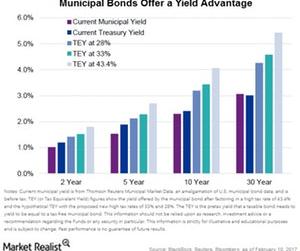What Caused the Muni Defaults in 2016?
In 2016, Puerto Rico defaulted on constitutionally guaranteed GO (general obligation) bonds. On May 3, 2017, Puerto Rico filed for Title III bankruptcy.
Nov. 20 2020, Updated 11:16 a.m. ET

VanEck
Puerto Rico Responsible for the Four Muni Defaults in 2016
Debt troubles continued to plague the island commonwealth of Puerto Rico in 2016. The report notes that while these defaults were very small in number when compared to the overall municipal bond universe, the sums involved were “extremely large in terms of debt affected.”
Taken together, the defaults by the four Puerto Rican entities — the Puerto Rico Infrastructure Finance Authority (PRIFA), the Government Development Bank (GDB), the Highways and Transportation Authority, and Puerto Rico’s General Obligation debt — affected $22.6 billion in rated debt through the end of 2016. The report noted that this made it “the largest annual default by a single U.S. municipal credit family in Moody’s history.” Moody’s sees Puerto Rico’s number of individual defaults rising in 2017, and that these could total as high as $64.3 billion by the end of the year.
Conclusion: Muni Bond Investments are Attractive
We believe that the findings in the Moody’s report underline the attractiveness of the muni bond asset class for investors. Just the two benefits we have noted, that muni credits remain highly rated, and those muni bankruptcies and defaults remain rare overall, should lead investors seriously to consider munis as a portfolio investment. And these benefits are in addition to the tax advantages an investment in muni bonds also offers.
Market Realist
Puerto Rico default
Moody’s report describes the Puerto Rico default as “an extreme example of correlated risk within a single credit family that not only includes GO bonds but extends to lease and revenue debt.”
In 2016, Puerto Rico defaulted on constitutionally guaranteed GO (general obligation) bonds. On May 3, 2017, Puerto Rico filed for Title III bankruptcy. Moody’s calculated that its “total rated and unrated debt is $68.4 billion, which includes less risky housing finance agency and tobacco settlement debt.” However, Moody’s believes that most of these debts would be restricted and renegotiated under the Title III bankruptcy process in court.
However, investors appear to consider the Puerto Rico default an isolated incident, and the municipal bond market retains its status as an attractive asset class owing to its tax benefit feature.
However, doubt could cast a shadow on muni bond (XMPT) yields if the Trump administration’s tax reform plans are implemented. A BlackRock article stated that even if tax changes occur, the after-tax yields of muni bonds would still have the potential to surpass those of US Treasuries (IEF), as shown in the chart above.
Key takeaways
As we’ve discussed throughout this series, the credit quality of municipal bonds should remain robust. Despite the recent defaults, the rate of default for muni bonds is still lower compared to other bond classes. Muni bonds’ lower correlation with other asset classes also offers diversification potential when the market is volatile (IWM) (EFA).
The key benefit of municipal bonds is their tax-exempt status, which is attractive to tax-aware investors. Municipal bonds (MUB) remain a major component of a well-diversified portfolio, offering high-quality tax-exempt income. However, considering the current market situation that revolves around the Fed’s balance sheet normalization program and fiscal policy changes in the US, investors should be cautious in their selection of investments.
